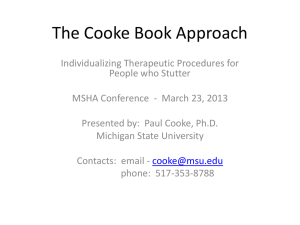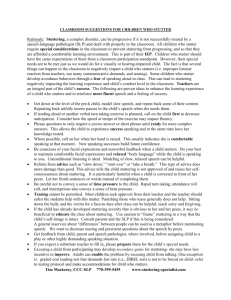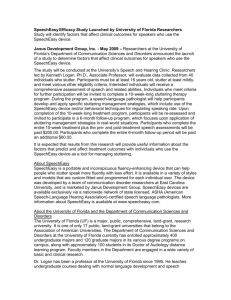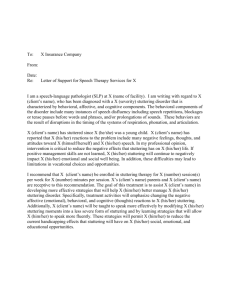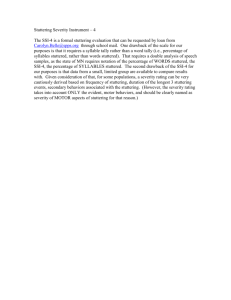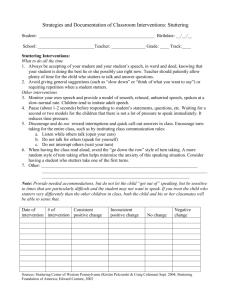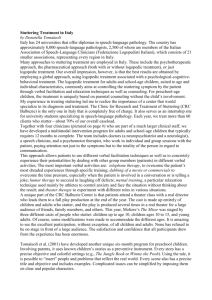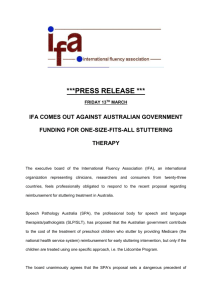Presenter - Central New York Speech, Language, and Hearing
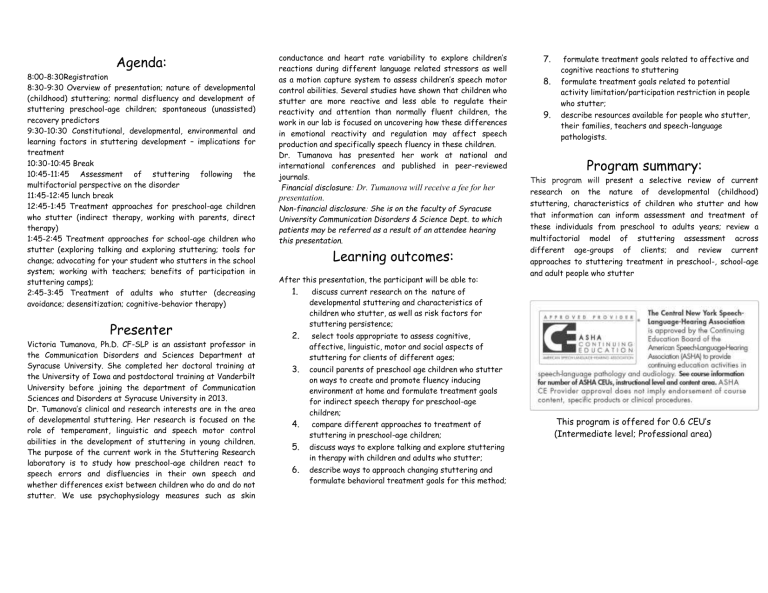
Agenda:
8:00-8:30Registration
8:30-9:30 Overview of presentation; nature of developmental
(childhood) stuttering; normal disfluency and development of stuttering preschool-age children; spontaneous (unassisted) recovery predictors
9:30-10:30 Constitutional, developmental, environmental and learning factors in stuttering development – implications for treatment
10:30-10:45 Break
10:45-11:45 Assessment of stuttering following the multifactorial perspective on the disorder
11:45-12:45 lunch break
12:45-1:45 Treatment approaches for preschool-age children who stutter (indirect therapy, working with parents, direct therapy)
1:45-2:45 Treatment approaches for school-age children who stutter (exploring talking and exploring stuttering; tools for change; advocating for your student who stutters in the school system; working with teachers; benefits of participation in stuttering camps);
2:45-3:45 Treatment of adults who stutter (decreasing avoidance; desensitization; cognitive-behavior therapy)
Presenter
Victoria Tumanova, Ph.D. CF-SLP is an assistant professor in the Communication Disorders and Sciences Department at
Syracuse University. She completed her doctoral training at the University of Iowa and postdoctoral training at Vanderbilt
University before joining the department of Communication
Sciences and Disorders at Syracuse University in 2013.
Dr. Tumanova’s clinical and research interests are in the area of developmental stuttering. Her research is focused on the role of temperament, linguistic and speech motor control abilities in the development of stuttering in young children.
The purpose of the current work in the Stuttering Research laboratory is to study how preschool-age children react to speech errors and disfluencies in their own speech and whether differences exist between children who do and do not stutter. We use psychophysiology measures such as skin conductance and heart rate variability to explore children’s reactions during different language related stressors as well as a motion capture system to assess children’s speech motor control abilities. Several studies have shown that children who stutter are more reactive and less able to regulate their reactivity and attention than normally fluent children, the work in our lab is focused on uncovering how these differences in emotional reactivity and regulation may affect speech production and specifically speech fluency in these children.
Dr. Tumanova has presented her work at national and international conferences and published in peer-reviewed journals
.
Financial disclosure
: Dr. Tumanova will receive a fee for her presentation.
Non-financial disclosure
:
She is on the faculty of Syracuse
University Communication Disorders & Science Dept. to which patients may be referred as a result of an attendee hearing this presentation.
Learning outcomes:
After this presentation, the participant will be able to:
1.
discuss current research on the nature of developmental stuttering and characteristics of children who stutter, as well as risk factors for stuttering persistence;
2.
select tools appropriate to assess cognitive, affective, linguistic, motor and social aspects of stuttering for clients of different ages;
3.
council parents of preschool age children who stutter on ways to create and promote fluency inducing environment at home and formulate treatment goals for indirect speech therapy for preschool-age children;
4.
compare different approaches to treatment of stuttering in preschool-age children;
5.
discuss ways to explore talking and explore stuttering in therapy with children and adults who stutter;
6.
describe ways to approach changing stuttering and formulate behavioral treatment goals for this method;
7.
formulate treatment goals related to affective and cognitive reactions to stuttering
8.
formulate treatment goals related to potential activity limitation/participation restriction in people who stutter;
9.
describe resources available for people who stutter, their families, teachers and speech-language pathologists.
Program summary:
This program will present a selective review of current research on the nature of developmental (childhood) stuttering, characteristics of children who stutter and how that information can inform assessment and treatment of these individuals from preschool to adults years; review a multifactorial model of stuttering assessment across different age-groups of clients; and review current approaches to stuttering treatment in preschool-, school-age and adult people who stutter
This program is offered for 0.6 CEU’s
(Intermediate level; Professional area)
REGISTRATION FORM
Stuttering conference 3/27/15
COST: CNYSLHA & regional members: $90
Non Members: $125 (includes CNYSLHA Membership)
Early Registration: $80 members (postmarked on or before 3/6, 21 days prior to workshop)
Early Registration: $115 non members (above information applies)
College Students; parents: $60
Continental Breakfast and Lunch included. Vegetarian alternative available
Deadline: check should arrive by 3/13/15
Registrations will be cut off at 100; no walk-ins honored
If you have any questions, please contact
CEAdministrator: Marge Graham 315-685-9085;
MargeSLP@aol.com
, Vice-President: Stacy Sinclair, space6180@yahoo.com
Mail To: CNYSLHA c/o Marge Graham
P.O. Box 655, Skaneateles, NY 13152
Make check Payable to: CNYSLHA
Sorry: No POs accepted without check by due date
Name: _________________________________________
Address: _______________________________________
______________________________________________
Phone #:___________ Email: _______________________
Regional membership: ______________________________
Check Affiliation: ___SLP; ___student; ___parent;
___other_______________________________________
Cancellation Policy: Registrations that are cancelled in writing, postmarked by 3/13/15 are refundable, minus a $15 service charge
New : Registration confirmation can be requested by emailing: MargeSLP@aol.com
http://www.themaplewoodinn.com/directionspointsofinterest.h
tml
